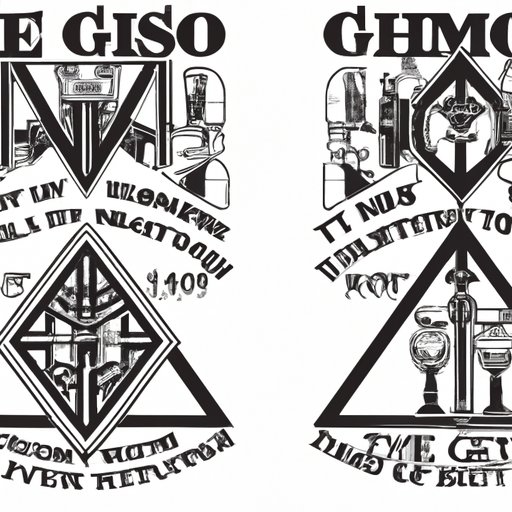
I. Introduction
The Freemasons are a well-known fraternal organization known for their secrecy, mysterious symbols, and philanthropic efforts. Despite being around for centuries, the Freemasons remain enigmatic to many. This article aims to shed some light on what the Freemasons are, their history, philosophy, and societal impact. Readers can expect to learn about the founding principles of the organization, notable historical figures who were members, the organization’s current operations, and personal accounts from members themselves. Additionally, this article aims to explore the significance and symbolism behind their rituals and practices, the controversies surrounding the group, and their influence on society at large.
II. An Overview of the History and Philosophy of the Freemasons
The Freemasons were founded in the early 18th century in London, England, as a social club for stonemasons. Over time, the organization evolved into a fraternal brotherhood that valued brotherhood, morality, charity, and the pursuit of knowledge and self-improvement. Notably, many well-known historical figures were members of the Freemasons, including George Washington, Benjamin Franklin, and Winston Churchill.
At its core, the Masonic philosophy revolves around three key principles: brotherly love, relief, and truth. The ideals of brotherhood, relief, and truth are manifested through various ritual practices and symbols that represent moral and philosophical values. The organization also places great value on the pursuit of knowledge and education, encouraging members to study a wide range of subjects and engage in philosophical discussions with other members.
III. A Perspective on Present-Day Freemasons
Today, the Freemasons continue to operate as a fraternal organization with over six million members around the world. The organization operates through a vast network of lodges, where members meet regularly to participate in rituals, ceremonies, and discussions. The organization also places great emphasis on charity work. For instance, the Masonic Charitable Foundation in the UK alone donates over £18 million annually to various charitable causes.
However, the Freemasons have also faced significant criticism and controversy, both historically and in the present-day. Many have accused the organization of being an elitist society that prioritizes members over non-members, of promoting secrecy and exclusivity, and of being affiliated with various criminal organizations. The organization has responded to these criticisms, emphasizing their commitment to openness, transparency, and self-improvement.
IV. Personal Accounts of What it’s Like to Be a Freemason
While the Freemasons can seem enigmatic and mysterious from the outside, personal accounts from members can provide a more humanistic and relatable perspective. Many members attest to the positive impact that the organization has had on their lives, citing the sense of community, brotherhood, and moral values that it promotes. Additionally, many members appreciate the ritual practices and symbols as a means of fostering a deeper understanding of themselves and the world around them.
V. An In-Depth Examination of Rituals and Practices of the Freemasons
To many, the Freemasons are known for their mysterious symbols and esoteric rituals. While there is a level of secrecy involved, many rituals and symbols are imbued with deep philosophical and moral significance. For instance, the Square and Compass is a well-known symbol within the organization that represents the importance of integrity, moral principles, and ethical behavior. The organization’s practices are also linked to various esoteric traditions, such as Hermeticism and Kabbalah.
VI. The Societal Impact of the Freemasons
The Freemasons have exerted notable influence on society, ranging from politics to business to culture. Many prominent historical figures, such as George Washington, were Freemasons, and it is believed that Masonic principles influenced the development of the United States Constitution. Additionally, Freemasons have been involved in various philanthropic efforts and have contributed significantly to art, literature, and music. However, the organization has also faced criticism for its influence on wealth and power, and its role in shaping political and economic systems.
VII. Conclusion
This article aimed to provide an overview of what the Freemasons are, their history, philosophy, and impact on society. Through exploring their rituals, practices, and beliefs, readers can gain insight into the organization’s significance and influence. While controversies surrounding the Freemasons persist to this day, personal accounts from members attest to the positive impact that the organization can have on members’ lives. Whether one is interested in the philosophical significance of Masonic symbols or intrigued by their impact on history and culture, there is much to learn about the Freemasons.





